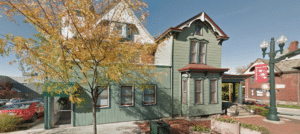 Abstinent Living at the Turning Point Review
Abstinent Living at the Turning Point Review
Abstinent Living at the Turning Point is a halfway house for women in Washington, Pennsylvania and surrounding counties. The facility has been owned and run by Patricia Lutz since 1991, and offers a residential drug and alcohol treatment program that has served over 1,000 clients since opening. Today Abstinent Living owns five properties, namely four sober livings and one administrative building. Making the fifth property a halfway house for women with minor children helped to complete Patricia Lutz’s dream of creating a complete and accommodating environment for women’s recovery.
Accommodations and Amenities
Abstinent Living’s original location is a cheerful green house on North Main Street in Washington, Pennsylvania. The town is walkable and from the convenient central location, residents can easily access shopping, 12-step meetings, church and public transportation. This halfway house can accommodate up to 24 women, and residents can expect to have three roommates. Only two of the bedrooms at the main house have two beds. This historic Victorian house has an intimate and old-fashioned appeal. Women at the house cook, clean and govern themselves as a team.
Julie’s House is Abstinent Living’s other halfway house, though it is reserved for women with infants and children up to four years of age. Julie’s House provides fully furnished apartments for mothers and their children. A made-up twin bed for mom and crib for the baby are provided. The modest, all-white bathrooms have showers, mirrors and matching towel sets. Each kitchen comes with all the standard fixtures, including a stove and oven, coffee maker and paper towels, as well as a two-person breakfast table.
The other two residential properties are called three-quarter way houses. Like the other two, these are also sober livings but, as the name suggests, residents in these three-quarter way homes are more advanced in their recovery. While halfway home life at Abstinent Living is hyper-structured in a way akin to inpatient care, three-quarter way living is not. At each three-quarter way house is a sober woman who acts as the resident house manager, but there are no therapeutic staff and the oversight at Abstinent Living’s three-quarter way homes is minimal.
Rules and Regulations
Abstinent Living is more than just sober living, as individual and group therapy are offered to women in all the residential programs. Clients at the main house are taught to value responsibility and self-esteem as skills with which to navigate life. Women in the house are given the opportunity to practice accountability by working collaboratively to run the house, and by obtaining full-time employment in the community. Each resident is assigned a weekly chore. Women are also required to become involved with the 12-step community by attending local meetings at least once daily. There are easily accessible noon meetings and women have several different options for evening meetings. Public transportation is available nearby for those without cars. Family and friends are allowed to visit every Sunday.
Julie’s House is a six month intensive program. Clients here also have individual and group therapy, but also education around childcare, boundaries and budgeting. Residents in therapy at Julie’s focus focus on relapse prevention.
Between all the houses, Abstinent Living has a devoted staff of 15. The clinical staff are licensed therapists who lead group therapy at the main house. The rest of the staff are unlicensed resident assistants and house managers who have personal experience with and working in recovery and most of whom have graduated from Abstinent Living’s program.
Extras
Abstinent Living also supports women who struggle with eating disorders, and encourages their involvement in Overeaters Anonymous. It is recommended that clients who struggle with eating disorders have completed an inpatient program for that behavior within twelve months of moving to Abstinent Living. Finally, there is also a weekly continuing care session for alumni on Tuesday evenings at the main house at 5 pm.
In Summary
Potential clients at Abstinent Living at the Turning Point are immersed into the local 12-step community and must also work locally. Part of Abstinent Living’s mission is to give women the best opportunity for re-building a full life. They are able to build a foundation for recovery where therapy and house rules provide guidance and firm structure. The facility’s newest program, Julie’s House, is especially beneficial for any women with children considering treatment who can commit to six months’ sober living.
Abstinent Living at the Turning Point Location
Abstinent Living at the Turning Point
199 North Main St
Washington, PA 15301
Abstinent Living at the Turning Point Cost
$6,000; Medicaid (30 days). Reach Abstinent Living at the Turning Point by phone at (724)-228-2203.
Do you have a complaint or review of Abstinent Living at the Turning Point? Please use the comments area below to add your Abstinent Living at the Turning Point review.
Photo courtesy of GoogleMaps
Sponsored DISCLAIMER: This is a paid advertisement for California Behavioral Health, LLC, a CA licensed substance abuse treatment provider and not a service provided by The Fix. Calls to this number are answered by CBH, free and without obligation to the consumer. No one who answers the call receives a fee based upon the consumer’s choice to enter treatment. For additional info on other treatment providers and options visit www.samhsa.gov.



